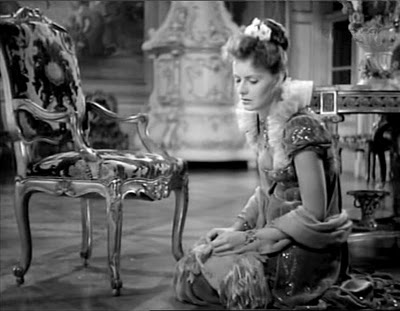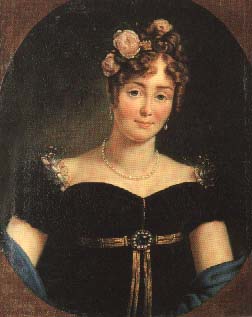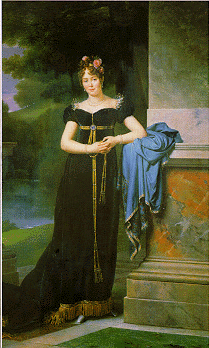CONQUEST
SUBJECTS — Biography/Napoleon Bonaparte; World/France, Poland & The 1800s;
SOCIAL-EMOTIONAL LEARNING — Romantic Relationships;
MORAL-ETHICAL EMPHASIS — Respect; Responsibility.
AGE: 12+; No MPAA Rating;
Drama; 1937; 115 minutes; B&W.
There is NO AI content on this website. All content on TeachWithMovies.org has been written by human beings.

SUBJECTS — Biography/Napoleon Bonaparte; World/France, Poland & The 1800s;
SOCIAL-EMOTIONAL LEARNING — Romantic Relationships;
MORAL-ETHICAL EMPHASIS — Respect; Responsibility.
AGE: 12+; No MPAA Rating;
Drama; 1937; 115 minutes; B&W.
What if you were a young woman married to a man 50 years older than you? You live in a small country that had repeatedly been invaded and partitioned off to other countries. One day, the most powerful man in the world, the Emperor Napoleon, asks you to be his lover. He tells you that if you agree, he will look favorably on your country’s quest for independence. And then all the powerful men in your country ask you to agree to Napoleon’s proposal for the sake of your country. What would you do? What would you advise your sister, your daughter, or your wife to do in this situation? This movie describes the relationship between Napoleon Bonaparte (1769 – 1821) and his “Polish Wife” Marie Walewska.

This is a great romantic story, and an excellent supplement to courses on European history of the Napoleonic era. Tell your child that the film is reasonably accurate. The major historical error in the film is the opposition to Marie’s relationship with Napoleon by her husband and family. There is no record of Marie’s husband opposing her relationship with Napoleon. He made himself absent at all the right times. He legitimized the son she had by Napoleon. Marie’s family and the political leaders of the Polish people actively encouraged the relationship. In those days, the monarch could have any woman he wanted. Marie was unusual in that she resisted at all. Ask and lead your child through the answer to the Quick Discussion Question. If he or she seems interested in the issue, refer to the Social-Emotional Learning and Ethical Emphasis discussion questions.
If your child likes the film and expresses an interest have him or her read the Helpful Background section.
Napoleon Bonaparte was not only a great general who dominated Europe, he was also a great reformer establishing the Napoleonic Code in the countries that he ruled. These laws introduced many of the reforms of the French Revolution: abolishing feudalism and serfdom, permitting universal male suffrage and establishing a bill of rights that included freedom of religion (except in Spain).
Napoleon also required that the kingdoms he established adopt French style administrative and judicial systems, foster public education, open higher education to those qualified regardless of rank, and promote the arts and sciences by establishing academies and subsidizing scientists and artists. The reforms were quite popular. Only later did the people of the empire resent the fact that constitutional government was limited, war taxes were very high, and their sons were conscripted into Napoleon’s army.
Napoleon had short affairs with many women and several long term attachments. Napoleon’s major relationship with a woman was with his first wife, the Empress Josephine, whom he loved dearly. But Josephine could not bear him a child, and Napoleon needed a son to carry on his dynasty. For years Napoleon feared that he was sterile. When Marie Walewska had a son by him, Napoleon was overjoyed and accelerated his plans to put Josephine away and marry a woman of royal blood who would bring him allies and bear him a legitimate heir. He chose Marie Louise, a Hapsburg Princess. She bore Napoleon a son, but she refused to stand by Napoleon when he was defeated.
Poland has been under foreign domination for much of its history. It is situated on a plain between Germany and Russia and is without natural defenses. Over the centuries, when Germany was powerful, its armies would invade eastward through Poland. When powers in the east were strong, such as the Mongols and the Russians, they would storm west through Poland. During the seventeenth and eighteenth centuries, through force and the bribery of the Polish aristocracy, Russia, Prussia, and Austria partitioned Poland, eliminating the Polish state by 1797. Napoleon promised to reestablish Poland, and as a result, tens of thousands of Poles served him enthusiastically in the Napoleonic Wars (1799 – 1815). Napoleon never followed through on this promise, establishing only the tiny Duchy of Warsaw as an independent state. Napoleon was always willing to sacrifice Polish interests in return for concessions from Russia or Austria.
In 1815, after the defeat of Napoleon, the Congress of Vienna set the borders of post-Napoleonic Europe. It established a Kingdom of Poland, but the king was the Russian Emperor. Polish nationalists then began an independence movement which culminated in an armed insurrection in 1830. It was crushed by the Russians the next year. Despite increasingly brutal Russian suppression, armed resistance broke out in 1846, 1848, 1861 and 1863. No stable independent Polish stated existed until after the First World War, but even that was short lived. Germany and the Soviet Union followed historical precedent by dividing Poland between them in 1939. Poland was resurrected after World War II but existed only as a satellite of the Soviet Union. In 1990, with the Soviet Union on the brink of collapse, a truly independent Polish state was established.
Marie Walewska was the daughter of impoverished Polish nobility. At age 16 or 17, she rejected the young and handsome son of a Russian officer because she was unable to ally herself with the oppressors of her country. She was then pressured by her family to marry Count Walewski, a wealthy and respected member of the nobility, who was in his seventies. Count Walewski paid the farming debts of Marie’s family and fathered a son by Marie. Napoleon came to Poland in 1806 when he was 37 years of age. Marie Walewska was 18. The country was alive with the hope that Napoleon would liberate Poland. Marie, who idolized the Emperor, put on peasant dress and joined the crowd at one of the locations at which Napoleon’s carriage would stop. She asked to meet him and because of her great beauty, she was brought to him. Napoleon was enchanted and began a campaign to win her favors. Marie initially resisted his advances. Polish officials desiring to please Napoleon in hopes that he would establish Poland as a nation again pressured Marie to relent, and eventually, she did. Marie later fell in love with Napoleon, bore him a son, and remained faithful to him for years.
Marie Walewska herself described Napoleon’s words, in one of his early appeals to her:
“Didn’t you come running like a mad woman — at the risk of being stifled by the crowd — to see me and flatter me? I let myself be taken in by your passionate expression. And then you vanished. I tried in vain to seek you out; I could not find you. And when you finally did appear, all I found in you was ice, while I myself was burning! Listen, Marie! I want you to know that every time I have believed something was impossible or difficult to achieve, I have desired it ardently. Nothing discourages me. The phrase ‘It can’t be done!’ merely spurs me on, and I continue to advance. Since I am used to seeing people yield eagerly to my wishes, your resistance subjugates me. The idea of seducing you has gone to my head, and I am set upon it. I want — and you must understand this word well — I want to force you to love me.” (From Marie Walewska’s Memoirs and was found in Napoleon by Guy Daniels (Harper & Rowe, 1971) pp. 316 & 371. Marie dictated this memoir after she had remarried and after the Second Abdication, at a time when she would want to make it appear that she was acting as a Polish patriot. There is, however, nothing that we are aware of which contradicts this account.)
“Marie, I have revived the name of your country. It still exists, thanks to me. And I will do more than this! But just remember that, like this watch that I hold in my hands, which will shatter at your feet” — and he did throw it at my feet — “its name will perish. And so will all your hopes perish if you drive me to extremes by rejecting my heart and refusing me yours.”
Napoleon described Marie Walewska in these words: “She is an angel. It may justly be said that her spirit is as lovely as her features.” Many people agreed. Marie Walewska was renowned for her beauty and grace. Napoleon saw to the financial security of Marie Walewska and of their son. After Count Walewski’s death, Marie married a French nobleman, apparently without opposition from Napoleon, then in his final exile on the island of Saint Helena. (From Napoleon by Emile Ludwig (Boni & Liveright, 1926), page 264.)

Marie Walewska
Alexander Walewski, Napoleon’s son by Marie Walewska, became a distinguished diplomat, foreign minister, and senator of France. Throughout his public career, Alexander Walewski maintained the fiction that his father was Count Walewski, but he bore a striking resemblance to Napoleon and the identity of this biological father was well known.
Before the 20th century, marital fidelity was not considered important when a prince, king, or emperor desired a woman. Many people could not understand Marie Walewska’s initial refusal of Napoleon’s advances. (Apparently, she was one of a very few women desired by the Emperor who offered any resistance at all.) While the threat of public disapproval was always present, and Napoleon insisted at times on keeping their liaison a secret, the extent of their relationship was well known. Despite this fact, Marie was received at Court in Paris by the Empress Josephine and, when she took up residence in Paris or Warsaw, she was well received in society.
Historical Accuracy: History confirms most of the story told by this film: the adulation that many in Europe felt for Napoleon; the hopes of millions of Poles that Napoleon would reestablish a Polish state; the beauty and grace of Marie Walewska; how Napoleon and Marie met; Marie’s initial resistance to Napoleon’s advances; the pressure to relent placed upon her by Polish officials seeking favor with Napoleon; the love and selfless devotion that she came to feel for Napoleon; his affection for her and the limits of that affection; the son they had; Napoleon’s relationship with the Empress Josephine and the reasons for his marriage to the Austrian Princess Marie Louise; Marie Walewska’s separation from her husband; Marie’s visit to Napoleon at Elba and her visit to him just before the Second Abdication.
There are a few inaccuracies which will emphasize some of the historical lessons of this film if they are explained. Contrary to the film, Marie’s husband and her brother did not object to her relationship with Napoleon. There is no record, that we have found, of Count Walewski’s opposition. On the contrary, all indications are that he cooperated. He made himself absent at all appropriate times. Members of his family, on occasion, accompanied Marie when she went to visit Napoleon. Count Walewski acknowledged and legitimized Napoleon and Marie’s child as his own. Contrary to what is shown in the film, it was Marie who sought a divorce from Walewski under the liberalized laws of the Napoleonic Code and through the Church. Both of Marie’s brothers actively supported and facilitated her relationship with Napoleon.

Marie Walewska
This film is fairly accurate. It is inaccurate when it presents Marie’s family as discouraging her relationship with Napoleon. In fact, all of the family, including her husband encouraged and facilitated her liaison with Napoleon. The makers of this film felt that it would not be accepted if they included this fact. What does this tell us about changing standards of morality and films as sources of history?
Suggested Response:
In the U.S., it has not been permissible for a leader to have a sexual relationship with a young woman. (Note that Marie’s relationship was more than sexual, it was a life-long relationship of love and affection.) In ancient and medieval times, the king, emperor or ruler could have women whenever he wanted them. Few thought it improper. This view was still widely held in Europe during the early 1800s, although it was changing. Before Marie Walewska, no woman had resisted Napoleon. Marie was accepted in society even after their relationship was well-known. However, Napoleon could never publicly acknowledge it and was constrained to keep a pretense that it did not exist. His son by Marie never felt comfortable publicly acknowledging his paternity, although everyone knew who his father was and he looked very much like his father. He was well-respected and held positions of prominence in the French government, including Senator and Foreign Minister.
Films as sources of history are always dependent upon what the director and producer think will sell. In this case, they believed that 1800s standards of morality would not sell and sacrificed history to the market.
1. See Discussion Questions for Use With any Film that is a Work of Fiction.
2. Evaluate Napoleon as a leader of his people.
3. Did it do Napoleon any good to divorce Josephine?
1. Many women are attracted to men of power. What are the risks in such a relationship?
Suggested Response:
Relationships need more than just this type of attraction. There needs to be broad-based caring and compatibility on many levels.
2. What is wrong with a person (man or woman) of immense power, using that power to secure a relationship with a partner to whom they are attracted?
Suggested Response:
Romantic relationships should not be based on power. Instead, they should be based on consent freely given, caring feelings and mutual compatibility.
Discussion Questions Relating to Ethical Issues will facilitate the use of this film to teach ethical principles and critical viewing. Additional questions are set out below.
1. Evaluate Napoleon’s relationship with Marie Walewska from a modern-day ethical standpoint.
Suggested Response:
By modern day standards, they both acted unethically. Napoleon was in a position of power and led Marie on with promises of Polish independence. He did not marry her, and he did not acknowledge paternity of their son. He violated the Pillars of Respect and Responsibility. However, compared to most of Napoleon’s relationships with women, he treated Marie very well, and it appears that they cared for each other. While Napoleon had the power and his behavior was worse than Marie’s, she entered into an adulterous relationship. This is mitigated somewhat by the fact that, in the beginning, she was seeking independence for Poland. Eventually, Marie did obtain a divorce from her husband. [Napoleon’s son became a respected French diplomat and served the French government in high office. He kept the name Walewski but he looked very much like Napoleon and everyone knew his parentage. It did not keep him from being accepted in society and pursuing his career as a diplomat.]
2. What conflicting values was Marie presented with when Napoleon asked her to go to bed with him?
Suggested Response:
Her love for her country and her admiration for Napoleon conflicted with her ethical principles.
(Treat others with respect; follow the Golden Rule; Be tolerant of differences; Use good manners, not bad language; Be considerate of the feelings of others; Don’t threaten, hit or hurt anyone; Deal peacefully with anger, insults, and disagreements)
3. Describe what Marie Walewska got out of the relationship and what Napoleon got out of the relationship. Was it a relatively even exchange, was Napoleon simply using Marie Walewska, or was she using him? Suggested Response: Marie, who was married to a very old man, entered a relationship with a younger man she idolized and came to love. Her status in society was enhanced by her liaison with Napoleon. She never, however, received what she really wanted at the beginning, which was independence for Poland. Napoleon got a son, which he dearly wanted, and proof that he was not sterile. He was able to enjoy the favors of an extremely beautiful woman. He received comfort and affection from Marie, for whom he apparently had genuine affection. In the end, it’s obvious that both Marie and Napoleon received important benefits from their relationship.
(Do what you are supposed to do; Persevere: keep on trying!; Always do your best; Use self-control; Be self-disciplined; Think before you act — consider the consequences; Be accountable for your choices)
4. This is a story about another time in which standards of morality were different than they are today. Describe the differences.
Suggested Response:
At the time, many people believed that the monarch could choose any woman he wanted and could have multiple relationships. They did not consider it an ethical failing for Marie to consent to be the concubine for the monarch.
In addition to websites which may be linked in the Guide and selected film reviews listed on the Movie Review Query Engine, the following resources were consulted in the preparation of this Learning Guide: